When it comes to whiskey, one of the questions that often comes up is, “How many bottles are in a barrel of whiskey?” The answer to this question can vary depending on a few factors, such as the size of the barrel and the type of whiskey being produced.
Typically, a standard bourbon barrel holds 53 gallons or 200 liters of whiskey. However, it’s important to note that not all barrels are the same size, and different types of whiskey may have their own unique barrel specifications.
In general, a standard bourbon barrel can produce approximately 180 to 200 bottles of whiskey. This estimate is based on the assumption that each bottle contains approximately 750 milliliters or 25 ounces of whiskey.
Key Takeaways:
- The number of bottles in a barrel of whiskey can vary depending on the size of the barrel and the type of whiskey.
- A standard bourbon barrel can produce approximately 180 to 200 bottles of whiskey.
- Different types of whiskey may have their own unique barrel specifications.
Contents
- 1 Understanding Whiskey Labels
- 2 The Different Types of Whiskey
- 3 Understanding Bourbon Whiskey
- 4 Exploring Corn Whiskey
- 5 Bottled-in-Bond Whiskey
- 6 Understanding Proof and Alcohol by Volume (ABV)
- 7 Private Barrels and Store Picks
- 8 The Difference Between Batch and Single Barrel Whiskeys
- 9 How the Private Barrel Selection Process Works
- 10 Considerations for Buying a Private Barrel Whiskey
- 11 The Unique Appeal of Private Barrel Whiskeys
- 12 FAQ
- 13 What Are Some Recommended Whiskey Bottles to Pair with Different Foods or Flavors?
- 14 Source Links
Understanding Whiskey Labels
When it comes to choosing a bottle of bourbon whiskey, understanding the label is essential. It provides valuable information about the product, allowing you to make an informed decision. Let’s explore how to read a bourbon whiskey label and decode its secrets.
A well-designed bourbon whiskey label will typically include the following key details:
- Brand Name: The name of the distillery or brand that produced the whiskey.
- Age Statement: Indicates how long the whiskey has been aged in barrels.
- Alcohol By Volume (ABV): Specifies the percentage of alcohol in the whiskey.
- Distillery Location: The location where the bourbon whiskey was made.
One important thing to look for on a bourbon whiskey label is the phrase “Distilled and Bottled by.” This statement ensures that the whiskey was both distilled and bottled by the same distillery, ensuring the highest quality and authenticity.
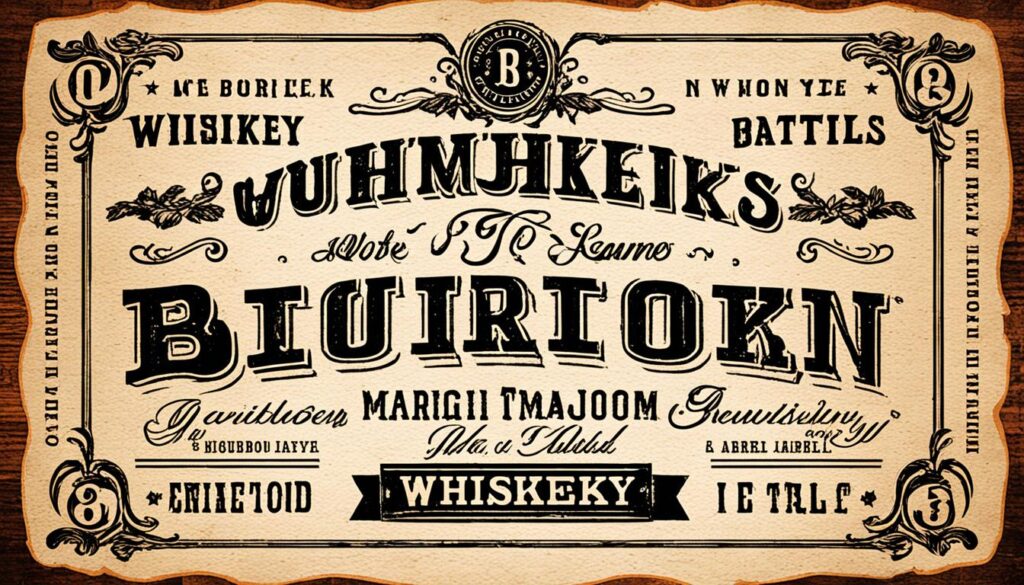
| Label Element | Explanation |
|---|---|
| Brand Name | Old Forester |
| Age Statement | 4 Years |
| Alcohol By Volume (ABV) | 45% |
| Distillery Location | Louisville, Kentucky |
Here, we can see that the bourbon whiskey is called Old Forester, aged for 4 years, has an ABV of 45%, and was distilled and bottled in Louisville, Kentucky. This information provides insights into the whiskey’s flavor profile and production process.
“Reading a bourbon whiskey label is like unraveling a beautiful story, full of rich flavors and craftsmanship.”
By understanding how to read a whiskey label, you can choose a bourbon whiskey that aligns with your preferences and ensures an enjoyable drinking experience. So the next time you’re browsing the whiskey aisle, remember to decode the label to uncover the hidden treasures within each bottle.
The Different Types of Whiskey
When it comes to whiskey, there are various types to explore, each with its own distinct characteristics and production methods. Let’s take a closer look at three popular types of whiskey: bourbon whiskey, corn whiskey, and bottled-in-bond whiskey.
Bourbon Whiskey
Bourbon whiskey is a well-known and beloved type of whiskey that is made primarily from corn. In fact, it must have at least 51% corn in its mash bill, along with other grains like barley, rye, or wheat. One of the things that sets bourbon apart is its aging process, which must take place in new charred oak barrels. Other regulations for bourbon whiskey include being produced in the United States and having a specific proof range.
Some popular bourbon whiskey brands include:
- Jim Beam
- Maker’s Mark
- Wild Turkey
Corn Whiskey
Corn whiskey is another type of whiskey that showcases the rich flavor of corn. To be classified as corn whiskey, it must have a mash bill consisting of at least 80% corn. Unlike bourbon, corn whiskey can be aged in used or uncharred oak containers, which gives it a unique character and flavor profile. Corn whiskey is often smooth and slightly sweet, making it a favorite among whiskey enthusiasts.
Some well-known corn whiskey brands include:
- Virginia Distillery Co.
- High West Distillery
- Smooth Ambler Spirits
Bottled-in-Bond Whiskey
Bottled-in-bond whiskey is a special designation that guarantees both the quality and authenticity of the whiskey. To be labeled as bottled-in-bond, the whiskey must meet specific legal requirements, including being the product of one distillation season and aged for at least four years. It must also be bottled at exactly 100 proof. Bottled-in-bond whiskey offers a level of craftsmanship and assurance that whiskey enthusiasts appreciate.
Some popular bottled-in-bond whiskey brands include:
- Old Forester
- Colonel E.H. Taylor
- Heaven Hill
Exploring the different types of whiskey allows you to discover the diverse flavors and styles within the world of whiskey. Whether you prefer the rich and robust notes of bourbon, the smooth sweetness of corn whiskey, or the time-honored craftsmanship of bottled-in-bond whiskey, there’s something for everyone to enjoy.
Understanding Bourbon Whiskey
When it comes to whiskey, bourbon holds a special place in the hearts of many enthusiasts. But what exactly is bourbon whiskey? Let’s dive into the definition, regulations, and aging process of this beloved American spirit.
Bourbon whiskey is a type of whiskey that must be made from a mash of at least 51% corn. This high corn content gives bourbon its signature sweetness and rich flavor profile. Other grains such as barley, rye, and wheat can also be used in the remaining portion of the mash.
To be considered bourbon, the whiskey must be aged in new charred oak barrels. The charred oak imparts unique flavors and characteristics to the whiskey during the aging process, adding depth and complexity to the final product. This aging process is a key factor in creating the distinct taste of bourbon.
Additionally, bourbon whiskey must meet specific proof requirements. It must be distilled to no more than 160 proof (80% alcohol by volume) and entered into the barrel for aging at no more than 125 proof (62.5% alcohol by volume). The final bottling strength must be at least 80 proof (40% alcohol by volume).
Furthermore, bourbon whiskey must be produced in the United States. While it is often associated with Kentucky, bourbon can be produced anywhere within the country’s borders, as long as it adheres to the regulations set forth by the U.S. government.
Now that we have a clear understanding of what bourbon whiskey is, let’s take a closer look at the regulations that govern its production:
- Bourbon must be made from a mash of at least 51% corn.
- It must be aged in new charred oak barrels.
- The whiskey must be distilled to no more than 160 proof and entered into the barrel for aging at no more than 125 proof.
- The final bottling strength must be at least 80 proof.
- Bourbon must be produced in the United States.
These regulations ensure that bourbon whiskey maintains its unique qualities and distinguishes it from other types of whiskey.
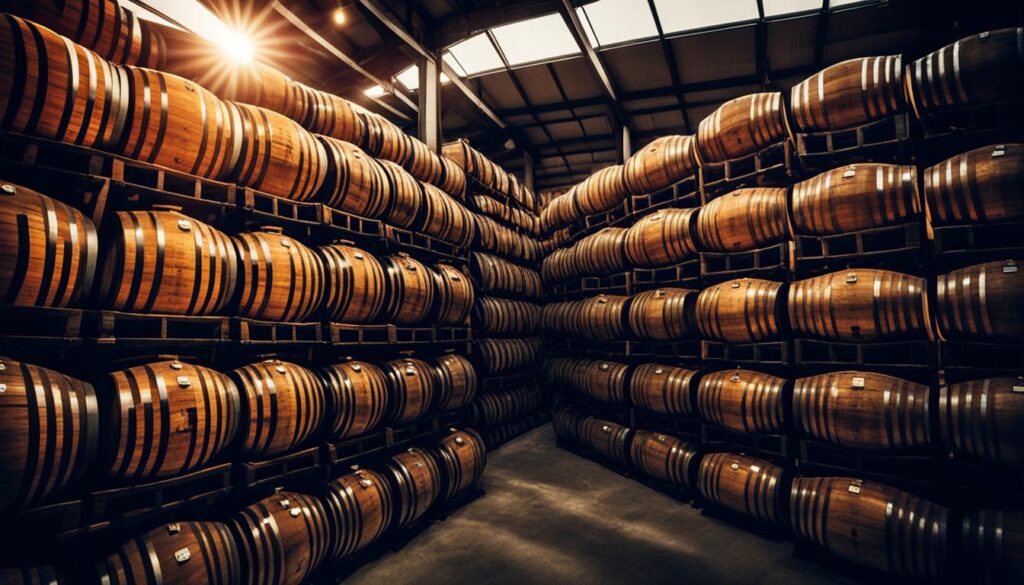
Exploring Corn Whiskey
Welcome to the world of corn whiskey! In this section, I’ll take you on a journey to discover the definition, aging process, and unique flavor of this intriguing spirit.
Corn whiskey is a type of whiskey that is crafted from a mash consisting of at least 80% corn. This high corn content gives it a distinct sweetness and grain-forward profile. Unlike bourbon, which also contains corn but must be aged in new charred oak barrels, corn whiskey is typically aged in used or uncharred oak containers.
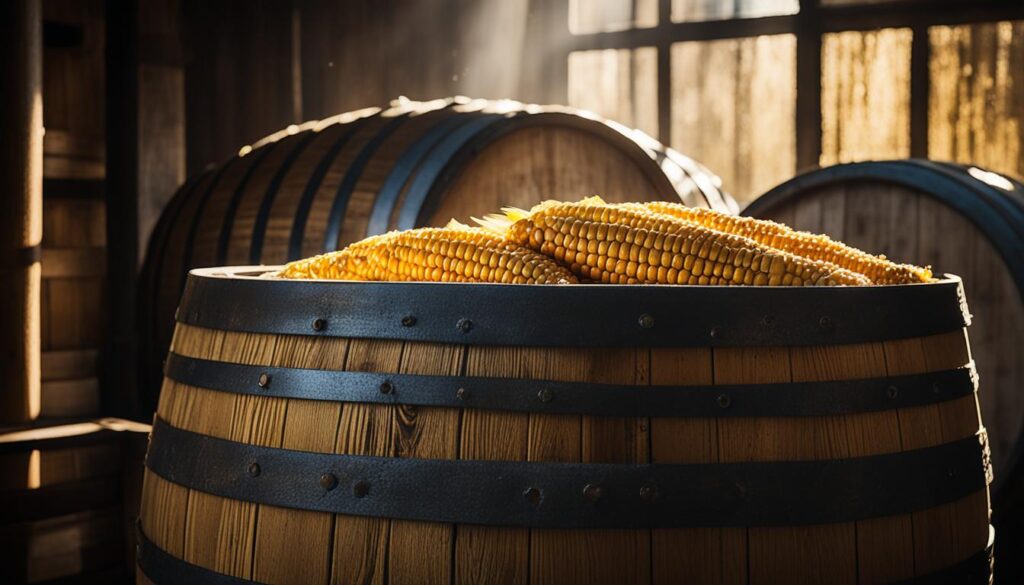
The aging process plays a crucial role in shaping the flavor of corn whiskey. During this time, the spirit interacts with the oak, extracting flavors and developing complexity. However, since corn whiskey is often aged in used or uncharred oak, it may not acquire as much oak influence compared to other whiskey styles.
The unique flavor characteristics of corn whiskey make it a standout in the world of spirits. Its prominent corn notes create a rich and earthy taste, with hints of grain sweetness. This distinct flavor profile sets it apart from other whiskey varieties and makes it a favorite among connoisseurs seeking something truly different.
To give you a better understanding of how corn whiskey compares to other whiskey styles, here’s a table highlighting the key differences:
| Whiskey Type | Primary Grain | Aging Requirements | Flavor Profile |
|---|---|---|---|
| Bourbon | At least 51% corn | Aged in new charred oak barrels | Sweet, caramel, vanilla |
| Corn Whiskey | At least 80% corn | Aged in used or uncharred oak | Distinct corn sweetness, earthy |
| Rye Whiskey | At least 51% rye | Aged in new charred oak barrels | Spicy, peppery, herbal |
As you can see, corn whiskey offers a unique drinking experience with its emphasis on corn and the absence of stringent aging requirements. Whether you’re a whiskey enthusiast or a curious newcomer, exploring the world of corn whiskey is sure to expand your palate and deepen your appreciation for this versatile spirit.
Bottled-in-Bond Whiskey
When it comes to whiskey, the term “bottled-in-bond” carries special significance. This designation ensures that the whiskey has been produced and bottled in adherence to specific legal regulations. In order to be considered bottled-in-bond, the whiskey must meet the following criteria:
- Product of one distillation season: Bottled-in-bond whiskey is made from the product of one distillation season. This means that it comes from a single distillery and a single distillation period, offering a level of consistency and quality that whiskey enthusiasts appreciate.
- Aged for at least four years: Unlike other types of whiskey, bottled-in-bond whiskey must undergo a minimum aging process of four years in a federally bonded warehouse. This extended maturation period allows the flavors to develop and mellow, resulting in a rich and complex spirit.
- Bottled at exactly 100 proof: Another requirement for bottled-in-bond whiskey is that it must be bottled at exactly 100 proof. This ensures that the whiskey has a consistent level of alcohol content, providing a balanced and harmonious drinking experience.
The bottled-in-bond regulations were established by the Bottled-in-Bond Act of 1897, a response to the proliferation of adulterated and counterfeit spirits at the time. This act aimed to protect consumers by guaranteeing the authenticity and quality of the whiskey they purchased.
The History of Bottled-in-Bond
“The Bottled-in-Bond Act of 1897 revolutionized the whiskey industry, setting a standard for quality and instilling consumer trust.” – Whiskey Historian
Since its inception, bottled-in-bond whiskey has been revered for its quality and integrity. The regulations surrounding its production and labeling ensure that consumers can trust they are purchasing a genuine and carefully crafted spirit.
| Key Requirements | Result |
|---|---|
| Product of one distillation season | Consistency and quality |
| Aged for at least four years | Rich and complex flavors |
| Bottled at exactly 100 proof | Balanced and harmonious drinking experience |
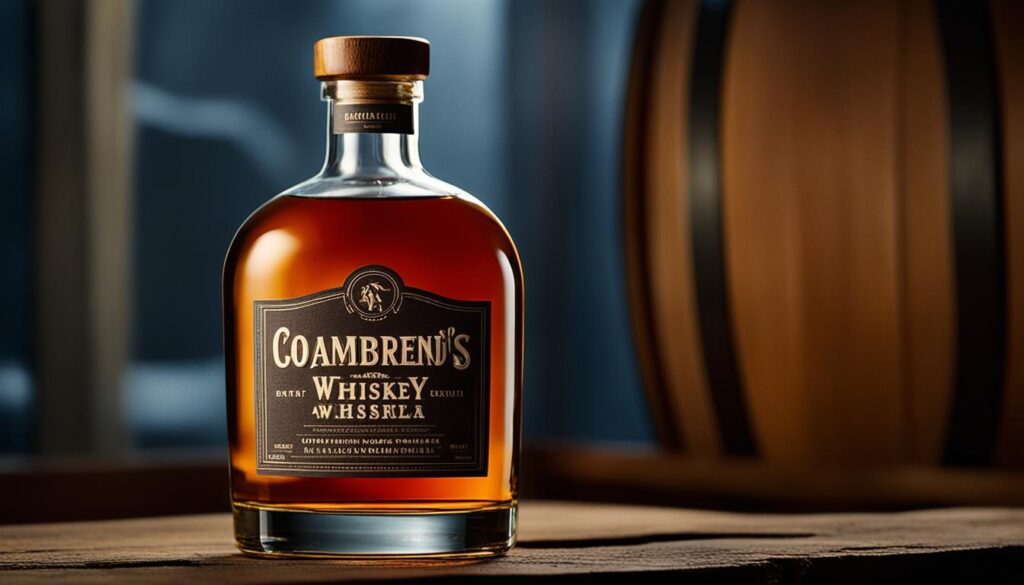
Bottled-in-bond whiskey is a testament to the skill and craftsmanship of the distillers who produce it. With its rich history and commitment to quality, it remains a favorite among whiskey connoisseurs seeking an exceptional drinking experience.
Understanding Proof and Alcohol by Volume (ABV)
When it comes to whiskey, understanding proof and alcohol by volume (ABV) is essential. Proof is a measurement of the alcohol content in a whiskey, while ABV represents the percentage of alcohol in the liquid. These two factors play a significant role in determining the strength and taste of your favorite spirit.
In the United States, the proof system is based on the ABV. The term “proof” originated in the 18th century when sailors would test the strength of their rations by soaking gunpowder in the liquor. If the gunpowder ignited, it was considered “proof” that the spirit contained enough alcohol. Today, the proof system is defined as twice the ABV.
For instance, if a whiskey has an ABV of 40%, its proof would be 80 (40% x 2). This system provides an easy way to understand and compare the alcohol content across different types of whiskey.
An accurate understanding of proof and ABV is crucial when enjoying whiskey responsibly. It allows you to gauge the strength of the spirit, helping you to pace yourself and savor the flavors in moderation.
Below is a table that illustrates the conversion between proof and ABV:
| Proof | ABV |
|---|---|
| 80 | 40% |
| 86 | 43% |
| 90 | 45% |
| 100 | 50% |
Note: The above table is for illustrative purposes and may not represent the exact proof and ABV conversions for all whiskies.
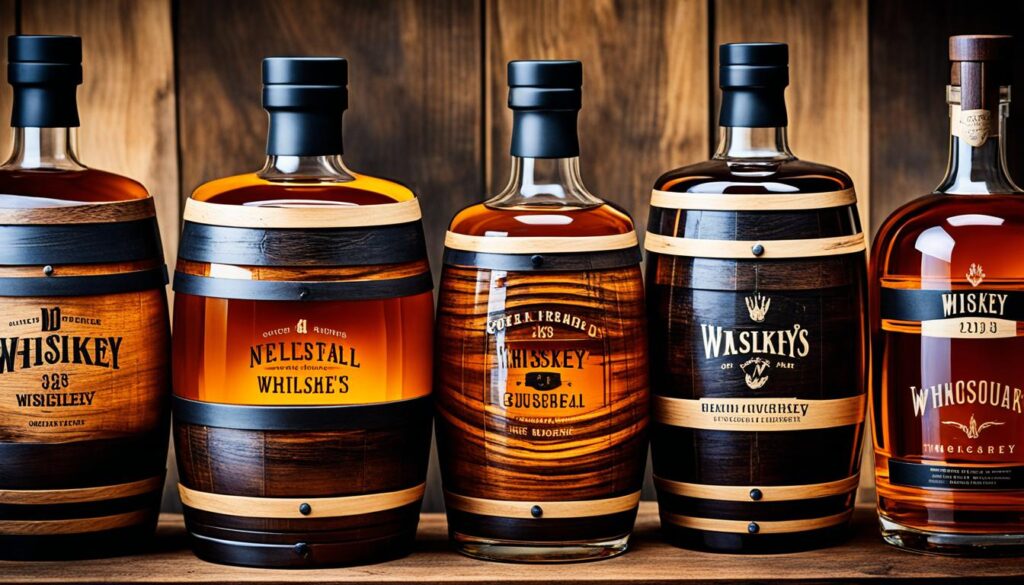
Understanding proof and ABV allows whiskey enthusiasts to appreciate the nuances of different products and make informed decisions when selecting their preferred libations. Whether enjoying a smooth and mellow bourbon or a bold and fiery rye, the knowledge of proof and ABV enhances the whiskey drinking experience.
Private Barrels and Store Picks
When it comes to whiskey, nothing quite compares to the unique flavor and experience of private barrels and store picks. These special selections of whiskey are hand-picked by knowledgeable retailers, bars, or restaurants, offering whiskey enthusiasts a one-of-a-kind drinking adventure.
Private barrels are individual barrels of whiskey that have been chosen by establishments to offer their customers a unique flavor profile. The retailer selects a specific barrel based on its exceptional qualities and distinctive taste. This means that each bottle from a private barrel is exclusive and cannot be replicated. The experience of sipping on a private barrel whiskey is truly exceptional, knowing that you are enjoying a whiskey that can’t be found anywhere else.
Store picks, on the other hand, are similar to private barrels but are curated by the retail store itself. These picks showcase the expertise and taste preferences of the store’s staff. Whether it’s a local liquor store, a whiskey bar, or a well-known whiskey retailer, store picks are carefully selected to offer customers a unique and personalized whiskey experience.
What sets private barrels and store picks apart is the attention to detail and the commitment to finding exceptional flavors. These special selections often undergo a rigorous tasting process, ensuring that only the finest and most unique whiskies make it into the barrel. This means that every sip is a true delight, filled with complex flavors and an unrivaled drinking experience.
If you’re a whiskey enthusiast looking to embark on a whiskey journey like no other, be sure to seek out private barrels and store picks. These exceptional whiskies will not disappoint, offering you a taste of the extraordinary.
The Difference Between Batch and Single Barrel Whiskeys
When it comes to whiskey, there are two main categories that aficionados often come across: batch whiskey and single barrel whiskey. While both types have their own unique characteristics, understanding the difference between the two can help you choose the perfect whiskey for your taste. Let’s explore the nuances of batch and single barrel whiskeys.
Batch Whiskey: Consistency in Every Bottle
Batch whiskey is the result of combining multiple barrels to create a consistent flavor profile. Distilleries carefully select and blend whiskey from different barrels to achieve a harmonious balance of flavors. This process ensures that every bottle of batch whiskey from a particular release has the same taste and aroma.
In addition to consistency, batch whiskey allows distillers to experiment and create unique flavor profiles by blending different barrels. This flexibility gives them the opportunity to showcase their skills in crafting a well-rounded and enjoyable whiskey.
“Batch whiskey offers a consistent flavor profile that appeals to those looking for reliable and familiar taste.”
Single Barrel Whiskey: Uniqueness in Every Bottle
On the other hand, single barrel whiskey is sourced from a single barrel. This means that each bottle of single barrel whiskey has its own distinct characteristics, resulting in subtle variations in flavor from bottle to bottle. These unique flavors arise from the individual maturation process and the specific nuances of the barrel.
Single barrel whiskey provides whiskey enthusiasts with an opportunity to savor the complexities that arise from the interaction between the whiskey and the barrel. No two bottles of single barrel whiskey are exactly alike, making each experience truly one-of-a-kind.
“Single barrel whiskey offers a unique tasting experience, highlighting the subtleties of each individual barrel.”
Small Batch Whiskey: The Best of Both Worlds
While batch and single barrel whiskey have their own merits, there is also a third category called small batch whiskey. Small batch whiskey strikes a balance between batch and single barrel by combining a limited number of barrels, often chosen for their exceptional quality and flavor.
This blending technique allows distilleries to achieve a certain level of consistency while still preserving some of the unique qualities found in single barrel whiskey. Small batch whiskey offers a compromise for those who enjoy both consistency and variety in their whiskey.
The Choice is Yours
Whether you prefer the reliable consistency of batch whiskey, the individuality of single barrel whiskey, or the harmonious blend of small batch whiskey, the choice ultimately comes down to your personal preferences and the experience you seek.
Next time you find yourself browsing the whiskey aisle or perusing a drinks menu, consider the difference between batch and single barrel whiskeys. Appreciating the unique qualities of each can enhance your whiskey journey and deepen your enjoyment of this timeless spirit.
How the Private Barrel Selection Process Works
When it comes to choosing a unique and personalized whiskey experience, the private barrel selection process offers whiskey enthusiasts the opportunity to handpick their own barrel and customize the bottling and labeling. This exclusive process allows individuals to have control over the proof and other specifications, resulting in a truly one-of-a-kind whiskey.
Choosing a private barrel involves selecting a specific barrel of whiskey from a distillery’s inventory. The distillery typically offers a range of barrels that have been aged to perfection, each with its own distinct flavor profile. By tasting samples from different barrels, individuals can identify the one that aligns with their preferences and desired characteristics.
Once the barrel has been chosen, the purchaser can work closely with the distillery to customize the bottling process. This includes determining the proof, bottle size, and labeling design. It’s an exciting opportunity to create a whiskey that reflects one’s personal taste and style.
The private barrel selection process is often pursued by bars, restaurants, and retailers who want to curate their own unique whiskey offerings. By hand-picking barrels and customizing the bottling, these establishments can provide their customers with a truly exclusive and memorable drinking experience.
Choosing a private barrel allows individuals to take part in the whiskey-making process and create a whiskey that is tailored to their preferences, resulting in a truly exceptional drinking experience.
Considerations for Buying a Private Barrel Whiskey
When it comes to private barrel whiskeys, not all are created equal. It’s essential to carefully evaluate the quality and characteristics of the whiskey before making a purchase. Here are some key considerations to keep in mind:
1. Reputation and Track Record
Before buying a private barrel whiskey, take the time to research the reputation and track record of the retailer or establishment offering the barrel. Look for establishments known for their expertise in selecting high-quality barrels and providing exceptional whiskey options. Quality retailers often have a strong network of distilleries and a reputation for curating impressive private barrel selections.
2. Tasting Notes and Samples
Obtaining tasting notes and samples can be an invaluable step in evaluating private barrel whiskeys. Tasting notes provide detailed descriptions of the whiskey’s flavors, aromas, and overall profile. These notes allow you to assess whether a particular private barrel aligns with your taste preferences and desired drinking experience. Some establishments offer samples for customers to try before committing to a full bottle, helping you make an informed decision.
“Tasting notes provide detailed descriptions of the whiskey’s flavors, aromas, and overall profile.”
3. Quality and Flavor Profile
The quality and flavor profile of a private barrel whiskey can vary significantly. Consider the specific characteristics you’re seeking in a whiskey, such as smoothness, complexity, or unique flavor notes. Some private barrels may offer limited or exclusive editions with distinctive flavors not found in regular releases. Evaluating the quality and flavor profile ensures you select a private barrel whiskey that meets your expectations and preferences.
| Consideration | Description |
|---|---|
| Reputation and Track Record | Research the reputation of the retailer or establishment and their experience in selecting high-quality barrels. |
| Tasting Notes and Samples | Obtain tasting notes and samples to evaluate the flavor profile and determine if it aligns with your preferences. |
| Quality and Flavor Profile | Evaluate the quality and unique flavor characteristics of the private barrel whiskey. |
Considering these factors ensures that you make an informed decision when purchasing a private barrel whiskey. Take your time, explore the options available, and savor the experience of enjoying a truly distinct and memorable whiskey.
The Unique Appeal of Private Barrel Whiskeys
When it comes to exclusive whiskey experiences, private barrel whiskeys are in a league of their own. These unique expressions offer a one-of-a-kind drinking experience that cannot be found anywhere else. Crafted in limited quantities, private barrel whiskeys are truly a treasure for avid whiskey enthusiasts.
What sets private barrel whiskeys apart is their exclusivity. Each barrel is carefully selected, aged, and bottled for a specific retailer, bar, or restaurant. This means that the whiskey inside is not available on the open market. The exclusivity adds an air of sophistication and rarity to these spirits, making them prized possessions for collectors and connoisseurs alike.
Another aspect that makes private barrel whiskeys truly unique is their flavor profile. Due to the variation in aging conditions and barrel characteristics, each barrel imparts its own distinct flavors and aromas into the whiskey. This means that even within the same brand, each private barrel release can have its own personality and taste. For whiskey aficionados seeking a truly one-of-a-kind experience, private barrel whiskeys deliver.
Whether you’re a collector looking for the next limited edition release or a whiskey enthusiast seeking a unique tasting experience, private barrel whiskeys offer an opportunity to savor something truly exceptional. From the exclusive nature of these spirits to the distinct flavors they possess, private barrel whiskeys are a testament to the craftsmanship and artistry of whiskey-making.
FAQ
How many bottles are in a barrel of whiskey?
How do I read a bourbon whiskey label?
What are the different types of whiskey?
What is bourbon whiskey?
What is corn whiskey?
What is bottled-in-bond whiskey?
What is proof and how is it measured?
What are private barrels and store picks?
What is the difference between batch and single barrel whiskeys?
How does the private barrel selection process work?
What should I consider when buying a private barrel whiskey?
What is unique about private barrel whiskeys?
What Are Some Recommended Whiskey Bottles to Pair with Different Foods or Flavors?
When it comes to perfect whiskey pairings for enthusiasts, there are several recommended bottles to consider. For a smoky BBQ dish, a peaty Islay Scotch like Laphroaig can complement the flavors. For a sweet dessert, a bourbon like Maker’s Mark can enhance the experience. Experimenting with different flavors is key.